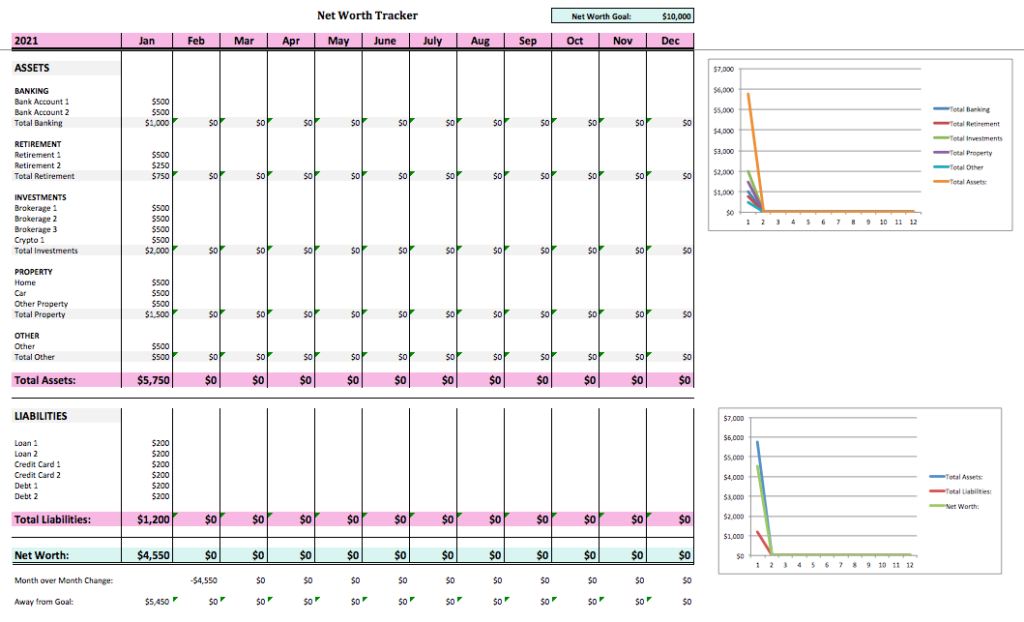Tracking your net worth is important to your financial strategy. This free net worth tracker will help you log your financial goals effectively.
Tracking your net worth can drastically help your financial journey and is extremely important as it enables you to clearly align your finances with your financial goals.
Do you know your net worth? I would venture to guess that the majority of people don't know their net worth off the top of their heads.
Knowing your net worth can affect the way you spend money, how you plan financially for the future, and the moves you make toward family goals.
Today, we are teaching why it's important to know your net worth, how to set financial goals, how to calculate your assets, how to set a “Money Date” you'll look forward to, and how to track your net worth on a monthly basis to look for trends over the years.
Let's get you started!
This post is all about how to track your net worth with a free net worth tracker excel spreadsheet to achieve your financial goals.
Net Worth Tracking
I believe knowing your net worth is one of the biggest keys to financial success.
Get ready, because you're about to start something that you will continue to do every month for the rest of your life…and you'll actually look forward to it (believe it or not)!
I personally track my net worth within Personal Capital and then transition those numbers manually every month into my net worth excel spreadsheet below. I recommend you do the same!
It's really fun when a new person on my personal financial team is reviewing my financials and starts mentioning the amounts I have because they always seem surprised that I knew the numbers like the back of my hand.
According to Forbes, the average American household has a $746,820 net worth. It's impressive when you know your financials because most people have no idea what they have.
Following a financial plan and strategy gives people freedom…and that's exactly what we're going to do right now!
What is Net Worth?
You may be thinking “this is great and all”, but what is net worth? Great question!
Your net worth is simply your ASSETS minus your LIABILITIES.
Net Worth = Assets – Liabilities
It is essentially how many assets you have to your name minus the amount of debt (liabilities) you have.
I will walk you through how to calculate it step by step with all of the things you'll need to include. It's fairly easy and I know you'll enjoy the process once we get you set up!
Related Articles about Financial Goals:
- How to Make Your Own FREE Personal Finance Organizer
- Beginner’s Guide to Investing: Step by Step Tutorial on How to Invest
- Want to Achieve Your Goals? Why Writing Them Down Will Make You More Likely
- 11 Habits of Millionaires that Make Them Successful Every Day
- Free Challenge Tracker: The New You in 28 Days
- Ultimate List of 45 Insanely Easy Ways to Make Money (that are actually good)
Why Should You Track Your Net Worth?
Tracking your net worth allows you to get a transparent picture of your financial health. It allows you to be able to plan for your future with your financial goals in mind.
By understanding exactly where you're at financially, you can align your financial strategy with your goals seamlessly.
In addition, I find that tracking my net worth started motivating me to save more and invest more when I saw progress in my net worth. It will do the same for you!
Plus, no one likes finding out at 61 years old that they won't be able to retire at 65 because they weren't planning appropriately. Let's not do that, that's no fun.
Tracking my net worth actually makes me double think purchases.
Do I want that $20 invested or do I want that purse?
I think about my colorful net worth spreadsheet and find myself double thinking unnecessary purchases!
If you keep track of your net worth every month and align it with your financial goals, you'll have a plan of action to simply follow for the rest of your life, without any of the unknown.
How great is that?
When Should You Track Your Net Worth?
I know my net worth at all times because I (you guessed it) track it…every single month.
In fact, I get SO EXCITED for the first of the month because it is my “Money Date” with myself!
I encourage you to schedule your own money date with yourself. This is your time to focus on your financial goals, vision board, and future.
Grab a glass of wine, put comfy pajamas on, start the fireplace and let's look at your net worth, girl!
This is also your time to congratulate yourself on the progress you've made or switch up your strategy for the next month with changes you need to make.
I like to choose the first of the month since it's a great time to reflect on the past month and decide how to proceed in the next month!
Either way, set up a recurring “Money Date” in your calendar with yourself right now! (Yes, right this minute!)
Where to Track Your Net Worth?
I personally like to track my net worth in two places:
- Personal Capital
- My Net Worth Tracker Spreadsheet
Let's talk about each of these.
1. Personal Capital
Personal Capital is an online app I use to track my net worth for free!
All you do is connect your accounts (assets and liabilities) and fill out the questions online.
It will automatically calculate everything for you. It's a fantastic (and super easy) tool for me because it is constantly updated with real-time measures from my actual accounts.
During the month, I'll check Personal Capital to make sure there aren't any blaring changes I need to address right away, etc.
I like to make sure I'm on track in a blink of an eye.
2. Net Worth Tracker Excel Spreadsheet (Free)
If you're anything like me, you also like everything to be at your fingertips at all times with full control. Therefore, the second tool I use (because I'm Type A and like to track things manually) is my excel net worth tracker.
This is the EXACT net worth tracker I use to track my own financials!
I have the columns and charts automated so that all you will need to do is fill in your details each month. Everything will populate automatically.
It is customizable so you can add additional streams of assets and liabilities to your tracker.
I just create new tabs each year so that I can efficiently track my net worth over the years!
Requirements: You will need Microsoft Excel for this spreadsheet.
This Microsoft Excel document I built allows me to follow financial trends in my assets, set goals for myself, and see my month-over-month changes seamlessly.
It's something I fill out monthly on my “Money Date” manually.
It keeps me accountable and allows me to track trends and changes in my net worth over time.
Next, I like to double-check it against Personal Capital to make sure everything aligns. (I used to be an auditor so I'm a checks and balances kind of girl.)
My favorite thing is to set goals for myself in the spreadsheet and then document what my net worth was at each age in life so that I can note progress over time.
I've made my exact net worth tracker spreadsheet available for my readers.
Now, once you have Personal Capital and your net worth tracker spreadsheet, let's run through how to calculate your net worth.
How to Calculate Your Net Worth
Here are the steps to calculate your net worth (and how to fill out my net worth tracker spreadsheet).
1.) Make a List of Your Assets
First, list out all of your assets. I like to organize them by category, as you'll see in my net worth tracker document.
Next, you'll want to put the total dollar amount of each asset within the month you are in.
Over time, you will put these amounts in every month to track your progress.
Your assets may include (but are not limited to) the following:
a. Banking
- The amount in any of your savings and checking accounts
- Money in your HYSA (high yield savings account)
- The amount of money in your HSA (healthcare spending account), if you have one
b. Retirement
- Money in retirement accounts (401k, IRA, SEP IRA, etc)
c. Brokerages
- Money in brokerage accounts
- Employee stock options
d. Property
- The VALUE of your home (yes, the value it is today. If you aren't sure, look up your address in Zillow.com and it will normally tell you the estimated value today.)
- The VALUE of your car (keep in mind that cars depreciate every year, so look up the value of your car at Kelley Blue Book)
- The value of any large assets you have (boats, motorcycle, wedding rings, etc)
e. Other
- Anything else you may have that's of value
2.) Make a List of Your Liabilities
In the spreadsheet, under “Liabilities”, list all of your liabilities and the total amount still due for each one.
Liabilities may include (but are not limited to):
a. Loans
- Car Loans
- Mortgage Loans
- Student Debt Loans
- Business Loans
b. Credit Cards
- List all credit card balances each month
c. Other Debt
(P.S. I have some great debt payoff trackers and methods that are effective at paying off debt!)
3. ) Subtract Your Liabilities from Your Assets
Now, if you have my net worth spreadsheet, it should automatically do this math for you.
All you need to do is subtract your liabilities from your assets.
Here's how to calculate your net worth:
a. Add up all of your assets
b. Add up all of your liabilities
c. Subtract your liabilities from your assets
This will give you your net worth.
The spreadsheet should calculate everything for you automatically, but if you're having issues, just email me (thefinancialcookbook@gmail.com) and I will get back to you right away.
You're done! You now know how to track your net worth on a monthly basis!
Summary of How to Track Your Net Worth
By now, you should know exactly how to track your net worth on a monthly basis to financially prepare yourself to accomplish your financial goals!
If you'd like to grab my net worth tracker spreadsheet, you can join me every month on the 1st for a Money Date!
In fact, feel free to tag me on Instagram @financialcookbook during your money date! I'd love to celebrate with you!
Recommendations to Assist with Financial Goals
Financial Tools
This is a list of my favorite financial tools (almost all are free) to help you accomplish your financial goals with ease. I use all of these tools for my financial strategy so I'm sharing them with my readers in the hope that they will help you as well!
High Yield Savings Account
The average interest rate you make at a normal savings bank is .05%. However, a high yield savings bank will make you up to 16X more in interest! This is one of those no-brainers, free money, “everyone should be doing” decisions. I always recommend keeping your 5-year goal money and emergency fund money in a high yield savings account.
Credit Monitoring Service
I highly recommend some sort of credit monitoring service (to make sure nothing goes astray). I can't even describe how this has helped me! I use TransUnion for this. They have a free version, but I highly recommend paying the low monthly cost for such a high reward. They will track your credit score so that you can check it at any time, but also email you every time there's a change in your credit. This means you are informed if there is any kind of fraudulent behavior on your account so you can take care of it right away. There's nothing worse than going to get a credit card or home and being denied because someone had opened a credit card in your name and now your credit is ruined. Be proactive and get some sort of monitoring service. The peace of mind is so worth it!
Related Articles about Financial Goals
- Beginner’s Guide to Investing: Step by Step Tutorial on How to Invest
- How to Make Your Own FREE Personal Finance Organizer
- How to Freeze Your Credit: A Financial Task You Need to Do ASAP
- Want to Achieve Your Goals? Why Writing Them Down Will Make You More Likely
- 11 Habits of Millionaires that Make Them Successful Every Day
- Free Challenge Tracker: The New You in 28 Days
- Ultimate List of 45 Insanely Easy Ways to Make Money (that are actually good)





This site was… how do you say it? Relevant!! Finally I have found something which helped me. Kudos!